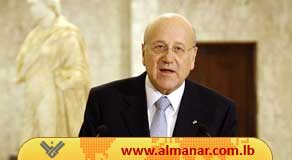Israeli daily Haaretz says collapse of government in Lebanon has weakened Iran and Hezbollah influence
 Israeli daily Haaretz said on Wednesday that the collapse of the Lebanese government and ouster of its head Saad Hariri has weakened Hezbollah and Iran’s influence instead of strengthening it.
Israeli daily Haaretz said on Wednesday that the collapse of the Lebanese government and ouster of its head Saad Hariri has weakened Hezbollah and Iran’s influence instead of strengthening it.
In an article written by Zvi Bar’el, the daily claimed that the joint statement by Lebanon and Bahrain stating that the two countries will not participate this year in the Venice Biennale "because of the events in the Middle East" is an almost natural continuation of the special cooperation the two have recently created. “But both countries have a problem that is slightly more menacing than the Biennale: a Shiite majority serving as a lever for Iranian intervention and the mutual fear of the benefits that Iran could gain from developments there.”
Last week it was the turn of Saad Hariri, who is still serving as prime minister of the transition government, to attack Tehran, Haaretz noted. It highlighted that Hariri, who had to step down from his post as prime minister last January when President Michel Sleiman turned to the billionaire Najib Mikati to form a new government, has apparently freed himself from the shackles of political correctness vis-a-vis Hezbollah and Iran.
 Haaretz went on to say that the exchange of barbs between Hariri and Hezbollah and Iran are not being made in a vacuum, but rather against the backdrop of a deeply divided country that has been without a government for three months.
Haaretz went on to say that the exchange of barbs between Hariri and Hezbollah and Iran are not being made in a vacuum, but rather against the backdrop of a deeply divided country that has been without a government for three months.
The Israeli daily pointed out that the establishment of a new government was supposed to mark the apex of political success for Iran and Hezbollah. Hezbollah's agreement to the appointment of Najib Mikati was supposed to put an end to the endless argument over the status of the weapons that Hezbollah has in its possession, especially after Hariri's unusual call last month for the group to disarm, Haaretz said.
According to Haaretz, Mikati, the head of a giant business conglomerate and an excellent negotiator, is now facing an especially difficult task. He understands that setting up a government in Lebanon is a great deal more complicated than appointing a board of directors. One sticking point is the appointment of the interior minister, a post coveted by all camps. Hezbollah wants the position in order to control internal security, decide on moves vis-a-vis the international tribunal, and to shape a new election law to right what they see as an injustice done to Shiites, the Israeli daily claimed.
 Now Mikati also has Iran in the mix, after Hariri placed it on his table and decided on Lebanon's attitude toward Tehran, Haaretz emphasized. It said that Mikati has explained that "expressing positions about Iran that do not reflect Lebanon's position is not effective," in other words, it would be best for Hariri to keep quiet. The self-imposed silence by Suleiman, though, who has so far not responded to the exchanges between Hariri and Iran, is making it difficult for Mikati to decide on Lebanon's foreign policy, Haaretz said.
Now Mikati also has Iran in the mix, after Hariri placed it on his table and decided on Lebanon's attitude toward Tehran, Haaretz emphasized. It said that Mikati has explained that "expressing positions about Iran that do not reflect Lebanon's position is not effective," in other words, it would be best for Hariri to keep quiet. The self-imposed silence by Suleiman, though, who has so far not responded to the exchanges between Hariri and Iran, is making it difficult for Mikati to decide on Lebanon's foreign policy, Haaretz said.
Meanwhile, Haaretz noted that pressure is mounting on Mikati to set up a government posthaste. It remarked that Hezbollah's partner, Gen. Michel Aoun, who heads the Free Patriotic Movement, has called on Mikati "to establish a government immediately or to resign from the job." Aoun, who is demanding 12 of the 30 cabinet posts for his movement, has already proven in the past that he is not willing to make compromises on portfolios with political or economic influence, Haaretz said.
Haaretz concluded that this crisis, together with what it called the violent crackdown in Syria, has put Hezbollah in an uncomfortable political position; when there is no government, there is no one on whom to exert pressure, there is no one from whom to "demand a price," and there is no way to promote its political interests.